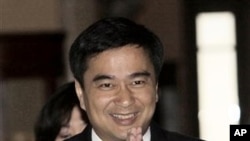Thailand has announced plans to hold a national election in July that many hope will bring stability to the country’s turbulent politics. The vote is expected to be a close race between Thailand’s traditional elite, represented by the ruling Democrat party of Prime Minister Abhisit Vejjajiva, and an opposition supported by former Prime Minister Thaksin Shinawatra.
This week Thai Prime Minister Abhisit Vejjajiva announced the dissolution of the House of Representatives, clearing the way for a July 3 nationwide election.
In a recorded message broadcast on national television, Abhisit said a return to polls could restore stability to the country’s politics.
He says the election is a new beginning for Thailand to move forward to effectively solve problems for people and families under democratic procedures.
Despite the prime minister’s optimism, political analysts are skeptical about the prospects for healing Thailand’s deep divisions.
The opposition Puea Thai party is backed by former Prime Minister Thaksin Shinawatra, who the military ousted in a 2006 coup. Since then, Thailand has been rocked by protests and violence in a power struggle between a traditional elite backed by the military and Thaksin’s supporters.
Thitinan Pongsudhirak, director of the Institute of Security and International Studies at Bangkok’s Chulalongkorn University, says Thaksin’s opponents have shown they are willing to go to great lengths to prevent his supporters from again holding power.
"The anti-Thaksin side, the establishment, they have tried to do all kinds of things to prevent this outcome, including a military coup, writing a new constitution, dissolving Thaksin's parties, banning the politicians of those parties, brokering the Abhisit government in the barracks," he said. "And, Abhisit government after two years in power still cannot win the hearts and minds."
Recent opinion polls give the Puea Thai party a slight lead over Abhisit’s ruling Democrats.
Last year thousands of opposition protesters known as Red Shirts occupied parts of the Thai capital for two months, demanding a new election and an end to what they said was unfair treatment of their leaders.
Abhisit ordered the military to clear the demonstration, resulting in clashes that left more than 90 people dead, most of them civilians.
Brad Adams, Asia chief for Human Rights Watch, told the Bangkok Foreign Correspondents Club last week that there has been no credible investigation into the deaths.
"It is clear that both sides still have very raw feelings about what happened last year. Both sides are going to use what happened last year as part of their campaign," he said. "And, I do not think there’s any prospect for getting to a point of reconciliation in the next two months during the campaign period. In fact, the campaign period is going to exacerbate this problem, undoubtedly."
Red Shirt leaders involved in the protests have been charged with terrorism and insulting the monarchy, which carries a penalty of up to 15 years in prison. However no soldiers have been charged, despite evidence that rights groups say shows the military killed unarmed protesters.
Rungrawee Chalermsripinyorat, Southeast Asia analyst for the International Crisis Group, says a key problem in Thailand is political interference in the justice system, which undermines faith in the government.
"This is something that the judiciary will have to try to address and that comes the issue of justice reform in this country, that how are we going to make people trust the judiciary, the justice system in this country," she said. "That, you know, all people, whoever that violate the law, will be treated equally."
Red-Shirt protesters say the government continues to crack down on them. In recent weeks the military has shut down Red Shirt-allied community radio stations and detained Red Shirt supporters.
Thailand has a rich history of military interventions in politics, with 18 coups or attempted coups since 1932. Despite rumors that the military will again intervene to prevent a Red Shirt election victory, army officials deny that they will stage another coup.
Analyst Thitinan in Bangkok predicts that without some kind of political compromise from both sides there will be no peaceful resolution to the current conflict.
"Many people have a vested interest in this establishment, in the established socio-political hierarchy, and it's very difficult to let that go," said Thitinan. "And, also, if we let all of that go, what comes next could be worse. So, somehow, a way in between, a compromise in between, is the best way forward. Both sides have to recognize that and reach out to the other side."
Among the Thai public, there seems to be little hope that political leaders will agree to such a compromise.
A survey this year by the non-profit Asia Foundation indicated that more than 80 percent of Thais believe that the country’s political divisions will once again lead to violence.
Thailand Sets July 3rd Election














